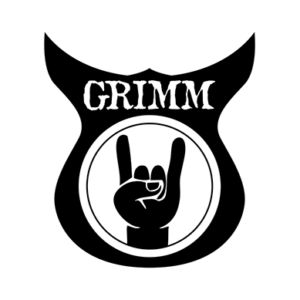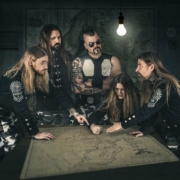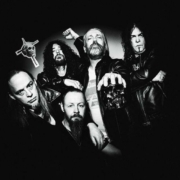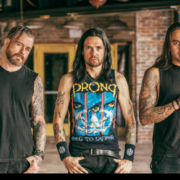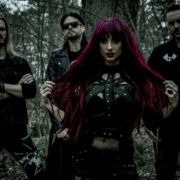Pallbearer is a band that defies classification. The Arkansas foursome have been called progressive doom, psychedelic doom, post-doom or even indie-doom. Suffice to say they are taking the subgenre of doom in a forward direction. Dressed up in the bass-heavy aesthetics of Black Sabbath, their songs have an emotional resonance that is closer to the introspective indulgence of Jawbreaker or the cathartic drama of Explosions in the Sky. 70s rock bands like Pink Floyd and Yes are among their influences as well. They have you tripping over intricate guitar and vocal arrangements, but in the end everything flows towards a satisfying conclusion. Great on record, they sound even more impressive live. Naturally, Grimm jumped at the opportunity to see Pallbearer in the flesh.
Le Botanique in Brussels is the perfect place to see Pallbearer live. In front of the Botanical Garden lies a stately cultural complex. Inside this glasshouse, you will find all kinds of exotic plants and watery features. At the center, there is a circular hall, a musical “Xanadu” where weary travelers may “dine on honey dew and drink the milk of Paradise”. In this wonderfully inviting setting, we were able to track down Pallbearer before they were to go on stage. Time was short, so we unleashed our questions with reckless abandon. Luckily, our interlocutors were in a good mood, full of energy at the start of their European tour. Guitarist and frontman Brett Campbell did most of the talking, but bassist Joseph D. Rowland and second guitarist Devin Holt had their say as well. Read on, if you want to find out more about Pallbearer’s past, their lyrical/musical aspirations and the true meaning of Pitchfork metal.
You guys are full-time musicians nowadays. What prepared you for this kind of life?
Brett: We just jumped into it. When we put out our first record, we weren’t really expecting to be touring at all.
Joseph: I always wanted to be a musician. That was my goal. At university, I couldn’t really find a major that I liked. All I wanted to do was to play music. I was working as a television producer when our first record came out. I guess everything fell into place from then on. We ended up working with an excellent booking agent. He was truly determined to put us on the road.
Devin: Nick is such an awesome guy. He had as much faith in us as we had in him. I dropped out of college in my very last semester to tour. I really think that was the right decision.
So you all come from metal backgrounds?
Brett: We like all kinds of music. Joseph and I played in a noise band before we did Pallbearer. I also spent a lot of time listening to progressive rock. Just as much as metal, if not more. There isn’t really a prog rock scene anymore, so our scene is probably metal, hardcore-punk or whatever. I think these genres are more mixed now than they were thirty years ago. Basically, any kind of off-kilter, left-of-center music is what we are interested in.
You are also identified as a psychedelic doom band. What’s your opinion on the whole revival of psychedelic sounds and imagery?
Brett: It’s cool that more people are becoming aware of that. There’s always interesting psychedelic music going on, although it’s not always categorized as such. We don’t consider ourselves to be a retro rock or psych band. We never tried to be part of a scene. There’s psych element but it’s not psych rock.
Devin: It’s more like psychedelic in spirit.
Brett: . . . and we use psychedelics (laughter).
Joseph: We just like heavy music. Doesn’t have to be metal, just emotionally heavy. It could be acoustic music and still be heavy. That’s what sparks an interest in us.
In the West, there’s something of a backlash going on against progressive cultures. Alternative lifestyles and different musical scenes are still going strong, however. What is the role of a band like Pallbearer in this current climate?
Brett: We try to make a positive impact on people’s lives in any way that we can. A lot of people told us that they’ve used our music to get through hard times and life struggles. That’s unbelievably gratifying.
Do you think you can have a more general social impact as well?
Brett: There’s only so much any person can do, but I do what I can. Some of the messages in our music are about chastising the problems that we see in society. Hopefully, we encourage people to use their higher brain power ‒ not to base everything they do on a gut feeling. A lot of times that can lead you astray. You have to be aware and try to be good for other people in the world. The song “I saw the end” is essentially about what could be the end of the world. It’s like a warning.
You wrote a couple of shorter songs for Heartless, your latest album. Was that a conscious decision? Famous bands like Rush have done something similar in the past.
Brett: Only two songs on the new record are shorter than our average ones. The rest are around nine minutes or so. But yeah, that was a conscious thing. Literary because Rush can do it. As a rule, the more time you have, the more you can develop your ideas. So it was a challenge to write something that isn’t a nine-minute song (or longer) yet still contains all the elements that make it a Pallbearer song.
Is that the way we can expect your music to evolve in the future as well?
Brett: It’s going to be more complex. Not necessarily in a shreddy kind of way, although that’s possible too. In general, we try to write challenging music. We’re not looking to be a Watchtower/Dream Theater kind of band. It’s not about our instrumental prowess.
It’s not about wanking. (Collective silence). Um . . . well sometimes maybe it is.
Devin: It can get lonely out there (laughter)
Brett: We continually try to evolve. With every record we want to push our sound further and in more directions. We don’t like to restrict ourselves. The result can be a one minute song or a 30 minute song. We’re still very much into the idea of long and epic songs. We still have to write our own “Close to the Edge” (smiles).
Now that’s ambitious. I’ll make sure to post a reference to that opus for our readers’ education.
Brett: We love making music and do it constantly. We told our tour manager that we can’t be on the road without breaks. If I don’t write music for three years, I go insane. When at home, I write constantly. It’s inevitable that we are going to come up with more music. It’s all we do for fun essentially.
A question about your new label. Why did you sign a deal with Nuclear Blast in Europe?
Brett: Profound Lore, our American label, lacks heavy distribution in Europe. That was something we noticed the few times we toured Europe in the past. Virtually every show, people would come up and thank us for bringing the album. They couldn’t really find it in stores. It was only available at ridiculous (import) prices. So we set things in motion to get a European label to back us and still keep our contract complete with Profound Lore.
So Nuclear Blast was the more flexible partner. They allowed you to remain on Profound Lore because that’s something you feel comfortable with?
Joseph: Absolutely, Chris (Bruni) has done well by us. It’s a small label but he’s gone above and beyond.
In Europe, the image of Nuclear Blast is not really what comes to mind when people think about Pallbearer.
Joseph: I see a lot of positives. They have been around for ever and obviously, they have a huge distribution network. They’ve done a very good job with our PR too. Monte Connor, the guy that signed us, has really good taste in music.
Brett: I’ve talked to him at great length. He is the guy that signed Rush and Type O Negative during his tenure at Roadrunner. He’s a real one for sure.
Last question: a couple of years ago, your second album, Foundations of Burden, was hyped by Pitchfork media. They called you one of the most promising bands in underground music. Their recent review of your latest album was a little bit less favourable. How do you react to that?
Brett: At the end of the day, it’s just one person’s opinion. Opinions are . . . well you know what they say about opinions (laughs). It is what it is. Maybe people won’t call us Pitchfork metal anymore, whatever that may be. We never try to court good reviews from anyone. We just make music the way we want it. People are either going to like it or they don’t. Thankfully, a lot of fans and critics are behind us. That’s more than enough to continue our journey.
